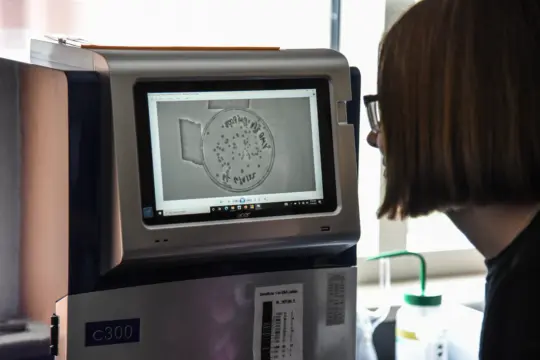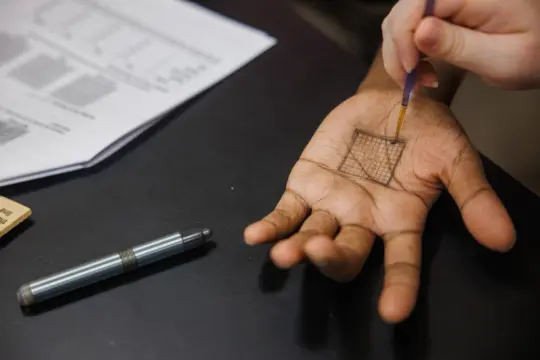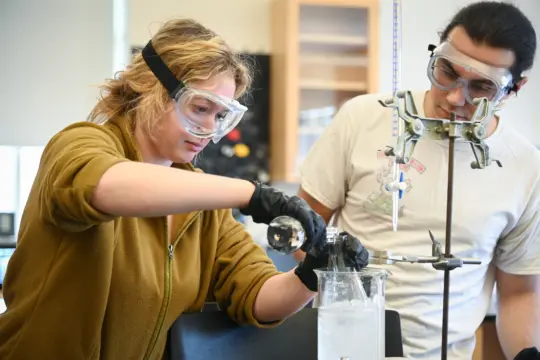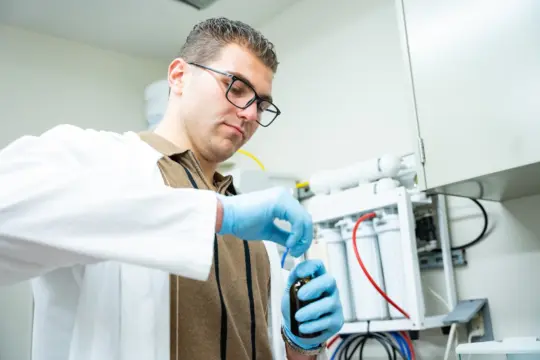
Health Care Studies Minor
Do you dream of a career in the medical field, but desire a flexible approach that will help you find clarity during your undergraduate years? Susquehanna University’s health care studies minor provides a strong foundation for your future, whether your passion leads to cutting-edge research or hands-on patient care.
Choose from a pre-health professions track or majors like neuroscience, biochemistry, biology, chemical physics, chemistry or psychology — all of which can lead to fulfilling careers in health care and match well with a health care studies minor. Even numbers-based majors, such as economics or mathematics, align well with health sciences career paths.
At Susquehanna, your journey starts with an advisor who helps you tailor your courses to match your strengths and career goals, whether you are preparing for graduate school or exploring different options within health care. With two required internships, you’ll gain hands-on experience and an impressive resume to guide your next steps.
GAIN REAL-WORLD EXPERIENCE WITH HEALTH CARE INTERNSHIPS
Susquehanna University offers invaluable hands-on internships, funded by a $50,000 grant, providing students with essential health industry experience and professional development opportunities.
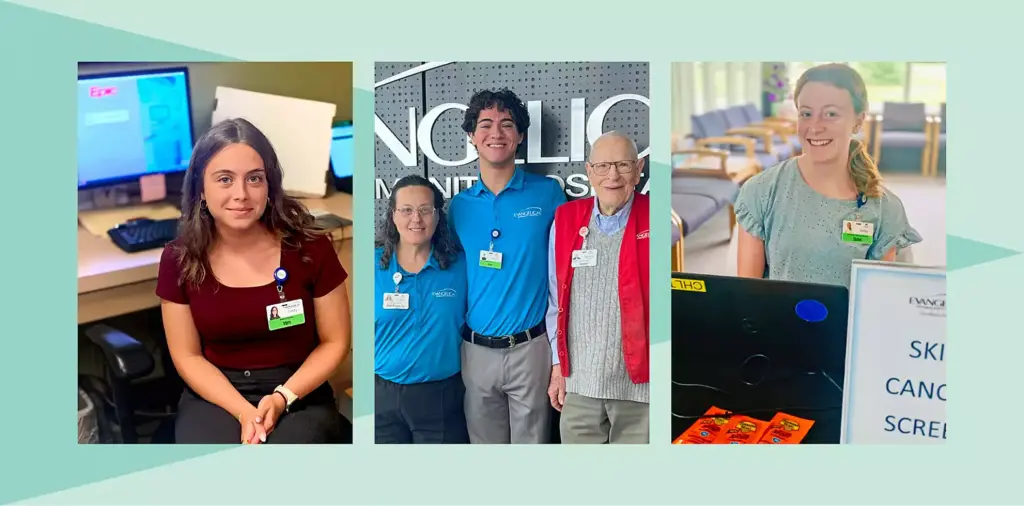
SUSQUEHANNA By the Numbers
More Than Metrics
100%
of students complete two internships as part of the minor
99%
of students receive financial aid through academic merit scholarships and need-based grants
SUSQUEHANNA MAJORS GO INTERDISCIPLINARY
Health Care Studies is an excellent complement to many other majors, such as biology and psychology. Learn how one student combined all three in pursuit of an exciting new program at Susquehanna University.
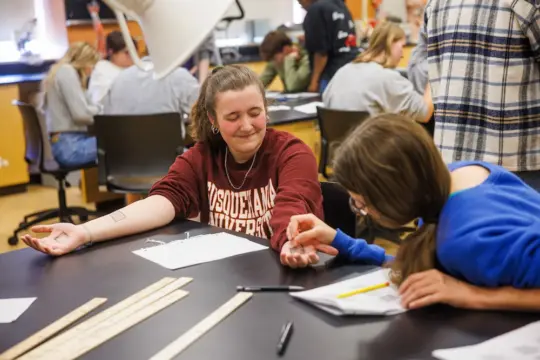
Explore Your Studies
program Resources
This course examines the major organ systems of the human body with an emphasis on structure as it influences function. It is designed to fulfill the entrance requirements of several health fields’ post-baccalaureate and graduate training programs. The course is taught in a workshop format with the laboratory integrated into the lecture topics. Included in this workshop are hands-on study of the human skeleton, intensive dissection of the cat and dissection of other pertinent mammalian organs. Students will be required to identify most of the major mammalian anatomical systems and their detailed structures using either human models, isolated mammal organs or a dissected cat. This course includes a discussion of some of the pathologies associated with human anatomy. This course cannot be used as a substitute for those courses in other programs that require cadaver dissection. Prerequisite: BIOL-101 or BIOL-102 or instructor’s permission for enrollment. 3 lecture hours, 3 laboratory hours. 4 SH.
This class focuses on the complex functioning of the individual organ systems of the body and how changing function may influence or be influenced by structure. The integrated interactions of each organ system with other body systems will be studied in detail within the contextual framework of maintaining homeostasis. Laboratory studies encompass many aspects of physiology, ranging from cell physiology to using humans as experimental subjects. Prerequisite: BIOL-102. 3 lecture hours, 3 laboratory hours. 4 SH.
This capstone course builds on the prerequisite courses in Human Anatomy and Human Physiology by focusing on select mechanisms and how they affect homeostasis and create varying states of human health. These processes will be contrasted with pathological processes involved in the development of human disease. An organ system approach will be used to facilitate the study of pathology, pathophysiology and organic disease states. In addition, this course also addresses the psychological, social and cultural impact of disease and the disease process on patients, their families and their community. It is most beneficial if Bioethics and the Business of Health Care have been taken before this course. This class is not intended to take the place of a formal pathology course as may be required by specific professional programs. Prerequisites: junior standing and completion of one of the following courses before, or simultaneously with, HLCR-370: HLCR-301 Human Anatomy, BIOL-320 Exercise and Extreme Physiology, or HLCR-302 Human Physiology. 4 SH. CC: Interdisciplinary.
Study of a particular topic in the health care area under the guidance of an appropriate faculty member. 1-4 SH.
A minimum of 40 hours of experience is required for each internship. Students may arrange for an internship from a wide range of health care disciplines and clinical settings, depending upon their interests. Typical settings include hospital or clinic-based practice, private practice, public health areas and service-learning opportunities. Internship experiences may range from strictly observational to more hands-on, depending upon the actual internship. Students must apply through the Office of the Registrar and submit a Student Learning Contract before beginning their internship. 1 SH. Instructor permission is required for enrollment.
When you enroll at Susquehanna, you’ll be paired with an advisor and application tool to guide you in your course planning and scheduling. The following is an excerpt from the complete course catalog. Enrolled students follow the requirements of the course catalog for the academic year in which they declare each major and/or minor and consult with their advisor(s).
Learning Goals
- The student will be able to assess career options and make informed choices about which are the best for them, given their interests and abilities.
- The student will be able to describe the nature of the health care system.
- The student will understand the impact of health care delivery on individuals and communities worldwide.
- The student will develop an appropriate knowledge base of key biomedical subjects related to the health care professions.
There are two health care studies minors creatively designed to address the needs of goal-oriented prehealth professional students. These minors also serve as an exploration of health care career options for undecided students. Both tracks require 24 credits of coursework and two separate 40-hour internships, each carrying one credit.
This program attracts students from many academic majors, including biochemistry, biology, business, communications, computer science, music and music education, neuroscience, psychology, Spanish and sociology. The interactions of students from such varying academic backgrounds enrich the student experience and contribute to their ability to view topics from multiple perspectives. The intentional choice to create this program as two minors ensures that while students will receive recognition for this body of work, they are not locked into a professional track and are free to alter their career plans.
Double-counting Restriction for Interdisciplinary Minors
Only 8 semester hours of this minor may be double-counted toward the student’s major.
Health Care Studies Minor Graduate Prerequisite Program
This minor is designed for students who plan on entering graduate programs that require Human Anatomy as a prerequisite course. These fields include but are not limited to: physical therapy, physician’s assistant, optometry, occupational therapy, accelerated nursing programs and other allied health careers. The minimum GPA for enrolling in the graduate prerequisite track is 3.30.
The minor requires 24 semester hours, including
- HLCR-301 Human Anatomy (4 SH)
- HLCR-302 Human Physiology (4 SH)
- HLCR-370 Human Health and Disease (4 SH)
- PHIL-224 Bioethics (4 SH)
- HLCR-080 The Business of Health Care (2 SH)
Students also take a four-semester hour elective course to be chosen from one of the following:
- BIOL-157 The Biology of Women
- BIOL-320 Exercise and Extreme Physiology
- BIOL-315 Animal and Exercise Physiology Lab
- BIOL-440 Behavioral Neuroendocrinology
- BIOL-441 Behavioral Neuroendocrinology Lab
- BIOL-560 Interdisciplinary Explorations in Biology when the topic being taught is either Human Parasites or Teratology
- BIOL-565 Assisted Reproductive Technologies and Genome Editing
- CHEM-302 Medicinal Chemistry
- CHEM-305 Forensic Chemistry
- CHEM-424 Biochemistry of Metabolism
- CHEM-426 The Biochemistry of Proteins and Enzymes
- CHEM-427 Biochemistry of Proteins and Enzymes Lab
- PSYC-242 Health Psychology
- PSYC-320 Psychological Disorders
- PSYC-342 Behavioral Neuroscience
- HIST-217 History of Medicine
- HIST-323 History of American Medicine
- or another four-semester-hour course based upon the student’s interests, with approval of the health care studies director
Two, one-semester internship experiences (each 40-hour minimum), which may be completed outside of the academic year, are also required.
Health Care Studies Minor Explorations Program
The minor requires 24 semester hours, including
- HLCR-302 Human Physiology (4 SH)
- HLCR-370 Human Health and Disease (4 SH)
- PHIL-224 Bioethics (4 SH)
- HLCR-080 The Business of Health Care (2 SH)
Students also take two four-semester hour elective courses to be chosen from one of the following:
- BIOL-157 The Biology of Women
- BIOL-320 Exercise and Extreme Physiology
- BIOL-315 Animal and Exercise Physiology Lab
- BIOL-440 Behavioral Neuroendocrinology
- BIOL-441 Behavioral Neuroendocrinology Lab
- BIOL-560 Interdisciplinary Explorations in Biology when the topic is either Human Parasites or Teratology
- BIOL-565 Assisted Reproductive Technologies and Genome Editing
- CHEM-302 Medicinal Chemistry
- CHEM-305 Forensic Chemistry
- CHEM-424 Biochemistry of Metabolism
- CHEM-426 The Biochemistry of Proteins and Enzymes
- CHEM- 427 Biochemistry of Proteins and Enzymes Lab
- HIST-217 History of Medicine; PSYC-242 Health Psychology
- PSYC-320 Psychological Disorders
- PSYC-342 Behavioral Neuroscience
- HIST-323 History of American Medicine
- or another four-semester-hour course based upon the student’s interests, with approval of the health care studies director
Students enrolled in the explorations program of the health care studies minor may take HLCR-301 Human Anatomy as one of their four-semester hour classes on a space-available basis.
Two, one-semester internship experiences (each 40-hour minimum), which may be completed outside of the academic year, are also required.
Meet the Faculty
TAKE A VIRTUAL TOUR
Launch Natural Sciences CenterYOU MAY ALSO BE INTERESTED IN
See the full list of related programs on the School of Natural and Social Sciences page.
Have Questions?
Contact Us
Start your journey.



